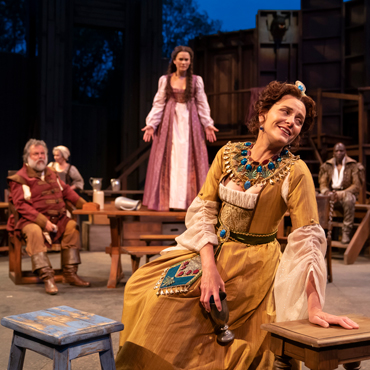
After more than a year of exhortations to keep our distance from one another, is it any wonder that so many of our besties during these lonely times should be imaginary—Lizzie Bennett, Jackson Lamb, Meg Langslow. Maybe we, ourselves, can't share a beer with the loyal companions we have come to know so intimately, but given the cosmopolitan landscape of the locales that Shakespeare's protagonists frequent, it's not a stretch to suppose that these impetuous expatriates might inadvertently cross paths with one another.
Take, for example, Kane Repertory and Oak Park Festival Theaters' recently-ended videostream of Matt Barbot's alternate-universe fantasy The Venetians. Amid the dockside clamor of that Italian port's mercantile hub, high-ranking Moorish army officer Othello importunes moneylender Shylock for a loan to finance his upcoming wedding, even as the ghetto-Jewish broker's own daughter prepares to elope with her goyishe swain—schemes incorporating the involvement, fair or foul, of a Veronese friar rumored to be sympathetic to runaway couples, an eccentric heiress in neighboring Belmont who selects her future husband from contestants in a quiz-challenge—oh, and the ghost of an African-born Roman who wanders the Rialto cradling his mixed-race baby son in his arms.
"Barbot walks a line I've seen very few playwrights do before, " says Kane Repertory Artistic Director Daniil Krimer "He modernizes Shakespeare, not just for entertainment's sake, but to explore the intersectionality of the characters in [the Elizabethan] world and in doing so, raise valuable questions about assimilation, identity and discrimination."
Inviting further examination of our universe in 2021 through the lens of Shakespeare's in 1642 is James DeVita's An Improbable Fiction, opening at American Players Theatre in productions both live-action (on the outdoor estate's Hill Stage), and streaming online.
DeVita sets his play in London, where a plague has shuttered the playhouses, leaving now-unemployed dramatis personae to do what theater artists have done throughout the ages, whenever the show cannot go on—congregate at the nearest bar. Unfortunately, the emergency measures engendered by the contagion have affected the city's many drinking establishments as well, making Falstaff the lone customer at the Boar's Head tavern in north bank Eastcheap—Christopher Marlowe, John Webster, "Tommy" Dekker and the remaining local playwrights having bunkered down south of the Thames at Mrs. Bull's Guest House in Deptford.
Gradually, more refugees arrive, seeking news of their comrades. One of these strays turns out to be that ubiquitous wearer of multiple names, The Messenger, from whom Othello learns that his beloved Desdemona has been sequestered at home by her father. Young Juliet Capulet, however, has fled her parent's protection, declaring herself weary of being "matched, like a china dish, worthless until made a set." Also joining the party is Cleopatra, likewise fed up with her boyfriend Antony's infidelities.
As distressing news of civil unrest continues to undermine Mistress Quickly's dogged attempts at keeping the peace (and the drinks) coming, Falstaff bides his time in patient anticipation of his loyal supporter Prince Hal's arrival—a reunion whose delay makes for increasing consternation among the company.
Despite reminders that Shakespeare wrote some of his greatest plays during the plague years, DeVita recalls, during the early days of the present covid lockdowns, "I didn't feel like writing. Nothing was coming to me, and I joked, 'what I ought to write is a play set during the plague, where all the actors are out of work, like us, and sitting around in a bar." Out of this wry fancy grew a vision of Falstaff, "the life of the party, in the pub where he holds court nightly—and suddenly there's nobody there! It's just Falstaff, he's bored and he misses his friends."
No one can deny crises making for vivid paradigm shifts—how long before a knee-to-knee-chest-to-chest baseball-game crowd on the Addison El platform will cease to be threatening? In the meantime, what do our immortal literary icons have to tell us nearly four hundred years later, other than to shame us for how far we have to go in ensuring the safety of ourselves and our fellow human beings? As Juliet laments, "Oh, happy people of the future, who will never know these miseries, and class our story with fables. All the world may be a stage, but we must stop acting as if we were merely players upon it!"
An Improbable Fiction runs at American Players Theatre in Spring Green, Wisconsin and online through June 26. Tickets and details at www.americanplayers.org
Mary Shen Barnidge
Contributing Writer

 Follow Us On Twitter
Follow Us On Twitter